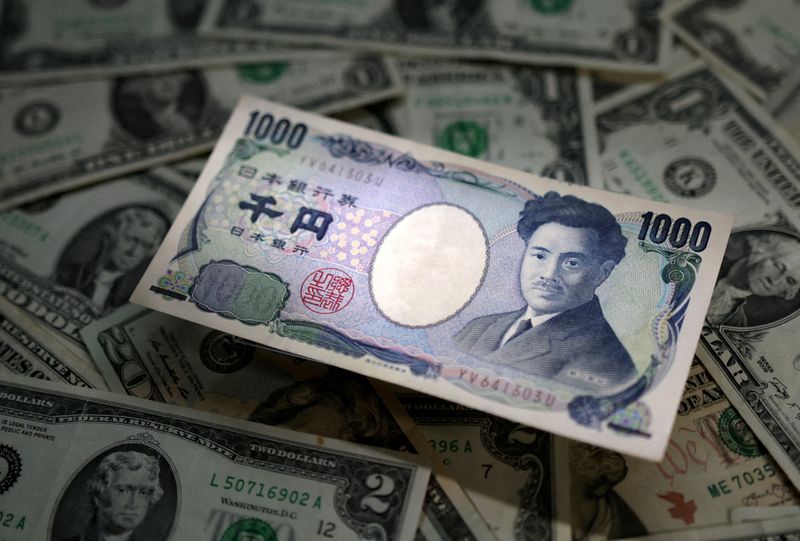By Leika Kihara
WASHINGTON (Reuters) – Japan and South Korea’s success in including language on their currency concerns in a joint statement with the U.S. this week underlines the political heat they face from stiff inflation exacerbated by weak exchange rates.
The matter is all the more urgent as tensions in the Middle East threaten to drive up oil prices and accelerate cost pressures, which have already taken a domestic political toll on both governments. For the US, the statement was a small price to pay to appease a few allies they need to stay on board with a more strategic goal: containing China.
In the first trilateral financial dialogue since the historic three-way leaders’ summit at Camp David last year, the US, Japan and South Korea agreed on Wednesday to “engage in close consultations” on currency markets, addressing “serious concerns” from Tokyo and Seoul over the recognized a collapsing economy. Japanese yen and South Korean won.
The U.S. dollar has appreciated broadly this year on prospects of a slowdown in the U.S. Federal Reserve’s shift toward rate cuts, but the yen and won have weakened against the dollar far more than most other currencies. Following this statement, the yen rallied as markets braced for the risk of intervention, with some traders signaling the possibility of coordinated action along the lines of the 1985 ‘Plaza Accord’. The victory also stabilized.
“The use of such strong language in the statement is a huge achievement for Japan and South Korea, and underlines the deep ties between the three countries,” said Atsushi Takeuchi, a former Bank of Japan (BOJ) official ).
“Given Washington’s acknowledgment of their concerns, it is unlikely to be an obstacle if Tokyo or Seoul were to intervene in the foreign exchange market,” said Takeuchi, who was involved in Japan’s intervention in the market a decade ago.
However, exchange rates were just one of a long list of issues discussed during the financial dialogue, which was reached under an agreement hammered out last August at the trilateral summit outside Washington.
Reflecting the summit’s focus on countering China’s growing presence in the Asia-Pacific region, finance ministers pledged to work together against “economic coercion and overcapacity in key sectors” by other countries, in a thinly veiled warning to Beijing.
And yet the strong market attention the currency language attracted was a political victory for Japan, where Prime Minister Fumio Kishida has suffered from falling approval ratings as rising costs of living hit households.
While major companies are offering huge wage increases this year, Japan’s inflation-adjusted real wages fell for the 23rd month in a row in February, as wages have not yet risen enough to offset the steady rise in prices.
The weak yen is particularly painful for a country like Japan, which is heavily dependent on fuel and food imports.
EXCHANGE RATE SENSITIVITY
Cost inflation – or price pressure due to increases in production costs – is also a political problem in South Korea. President Yoon Suk Yeol’s party suffered a major defeat in parliamentary elections this month amid accusations that the government had failed to curb inflation.
Bank of Korea Governor Rhee Chang-yong said on Wednesday that persistent domestic inflation was among the factors complicating the central bank’s decision on when to move away from tight monetary policy.
“The timing of the pivot is tricky,” Rhee said at a seminar during the spring meetings of the International Monetary Fund and the World Bank in Washington. “We would like to see more evidence that inflation is falling as we expect.”
Under pressure to slow the yen’s decline, Japanese officials spent significant time in Washington this week arguing why they might need to intervene in the currency market.
Treasury Secretary Shunichi Suzuki said on Wednesday that he explained Tokyo’s willingness to take appropriate measures against excessive yen movements during a bilateral meeting with US Treasury Secretary Janet Yellen.
The Group of Seven (G7) financial leaders also agreed to a Japanese proposal to reaffirm their belief that excessive volatility and disorderly movements in the currency market were undesirable.
BoJ Governor Kazuo Ueda indicated on Thursday that the central bank is prepared to raise interest rates if the weak yen’s boost to inflation becomes difficult to ignore.

“In both Japan and South Korea, inflation is very elastic to exchange rate movements,” Japan’s top currency diplomat Masato Kanda, who was involved in drafting the trilateral and G7 statements, told reporters on Wednesday.
“Because both countries import a lot in dollars, we are more concerned about exchange rate volatility.”


